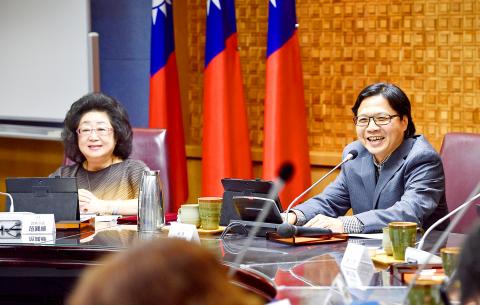The Ministry of Education yesterday instructed National Taiwan University (NTU) to re-elect a president from the five finalists of the previous election — including NTU finance professor Kuan Chung-ming (管中閔), whose election was rejected by the ministry in May — on the condition that Taiwan Mobile Co (台灣大哥大) vice president Richard Tsai (蔡明興) is barred from voting to avoid a conflict of interest.
The ministry is not asking the university to launch an election from square one, but only to “redo the step found to be flawed,” Minister of Education Yeh Jiunn-rong (葉俊榮) told a news conference at the ministry in Taipei.
The committee on Jan. 5 elected Kuan to be NTU president and he was originally scheduled to take office on Feb. 1, but the ministry on May 4 refused to approve his election on the grounds that there was a conflict of interest in the election process, as Kuan allegedly did not tell the committee that he was an independent member of Taiwan Mobile’s board of directors, even though Tsai was on the election committee.

Photo: Peter Lo, Taipei Times
The university, a group of NTU students and Kuan have each filed an administrative appeal requesting that the ministry honor the election results and appoint him.
A report issued by the Judicial Yuan on Aug. 16 concluded that Kuan had contravened the Act Governing the Appointment of Educators (教育人員任用條例) in his capacity at Taiwan Mobile, and that he and Tsai had each failed to disclose the conflict of interest prior to the election.
When the ministry requested a re-election in May, it did not specify how it should be conducted and the summer break has made it difficult for the election committee to meet to resolve the controversy, Yeh said.
“Now that school has begun, things should be different. The committee should convene a meeting to address the concerns raised by the ministry and the Control Yuan, and officially respond to them,” he said.
The committee must first determine whether to remove Tsai or have him refrain from voting, and then relaunch the final round of the election with the same five candidates, he said.
The candidates were Kuan, Institute of Atomic and Molecular Sciences director Chou Mei-yin (周美吟), Administrative Affairs vice president and physics professor Chang Ching-ray (張慶瑞), Graduate Institute of Networking and Multimedia professor Chen Ming-hsien (陳銘憲) and history professor Chen Jo-shui (陳弱水).
If NTU refuses to cooperate, the ministry would formally respond to the administrative appeal by Oct. 3, he said, adding that he hopes to avoid a lawsuit, because it might affect the university’s stability.
“Only by ensuring fairness can presidential elections be considered legitimate. I hope that there will be no more hesitation from either side, because the nation’s administrative procedures, which are essential to the rule of law, must not be further compromised,” Yeh said.

DAREDEVIL: Honnold said it had always been a dream of his to climb Taipei 101, while a Netflix producer said the skyscraper was ‘a real icon of this country’ US climber Alex Honnold yesterday took on Taiwan’s tallest building, becoming the first person to scale Taipei 101 without a rope, harness or safety net. Hundreds of spectators gathered at the base of the 101-story skyscraper to watch Honnold, 40, embark on his daredevil feat, which was also broadcast live on Netflix. Dressed in a red T-shirt and yellow custom-made climbing shoes, Honnold swiftly moved up the southeast face of the glass and steel building. At one point, he stepped onto a platform midway up to wave down at fans and onlookers who were taking photos. People watching from inside

A Vietnamese migrant worker yesterday won NT$12 million (US$379,627) on a Lunar New Year scratch card in Kaohsiung as part of Taiwan Lottery Co’s (台灣彩券) “NT$12 Million Grand Fortune” (1200萬大吉利) game. The man was the first top-prize winner of the new game launched on Jan. 6 to mark the Lunar New Year. Three Vietnamese migrant workers visited a Taiwan Lottery shop on Xinyue Street in Kaohsiung’s Gangshan District (崗山), a store representative said. The player bought multiple tickets and, after winning nothing, held the final lottery ticket in one hand and rubbed the store’s statue of the Maitreya Buddha’s belly with the other,

‘NATO-PLUS’: ‘Our strategic partners in the Indo-Pacific are facing increasing aggression by the Chinese Communist Party,’ US Representative Rob Wittman said The US House of Representatives on Monday released its version of the Consolidated Appropriations Act, which includes US$1.15 billion to support security cooperation with Taiwan. The omnibus act, covering US$1.2 trillion of spending, allocates US$1 billion for the Taiwan Security Cooperation Initiative, as well as US$150 million for the replacement of defense articles and reimbursement of defense services provided to Taiwan. The fund allocations were based on the US National Defense Authorization Act for fiscal 2026 that was passed by the US Congress last month and authorized up to US$1 billion to the US Defense Security Cooperation Agency in support of the

‘COMMITTED TO DETERRENCE’: Washington would stand by its allies, but it can only help as much as countries help themselves, Raymond Greene said The US is committed to deterrence in the first island chain, but it should not bear the burden alone, as “freedom is not free,” American Institute in Taiwan Director Raymond Greene said in a speech at the Institute for National Defense and Security Research’s “Strengthening Resilience: Defense as the Engine of Development” seminar in Taipei yesterday. In the speech, titled “Investing Together and a Secure and Prosperous Future,” Greene highlighted the contributions of US President Donald Trump’s administration to Taiwan’s defense efforts, including the establishment of supply chains for drones and autonomous systems, offers of security assistance and the expansion of